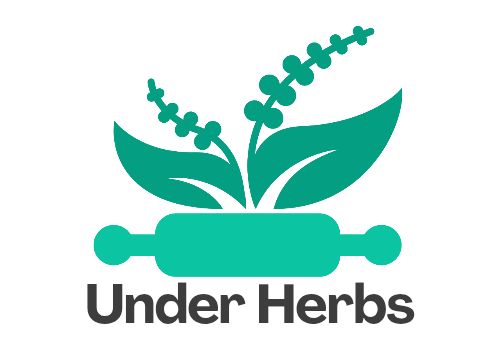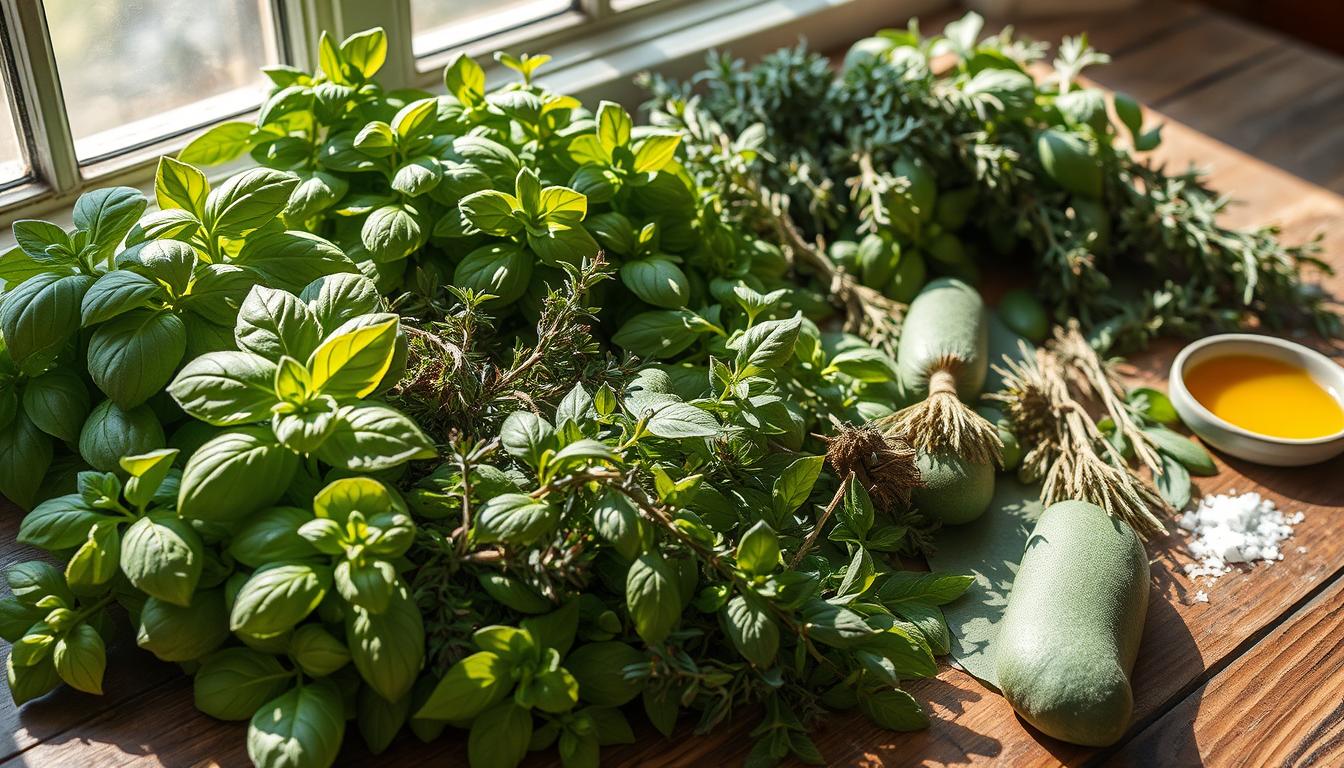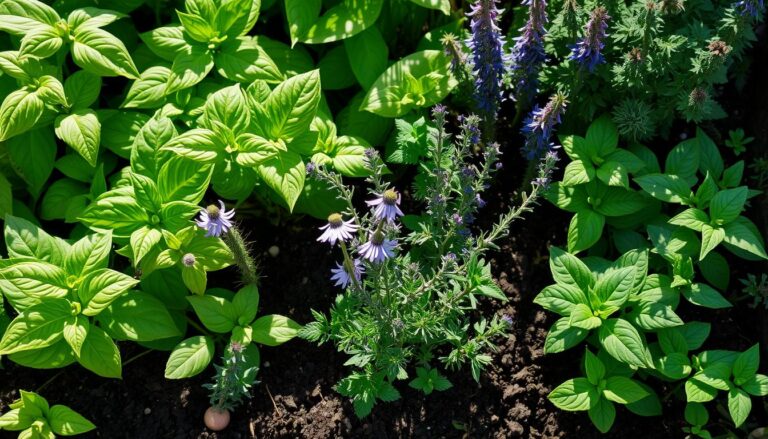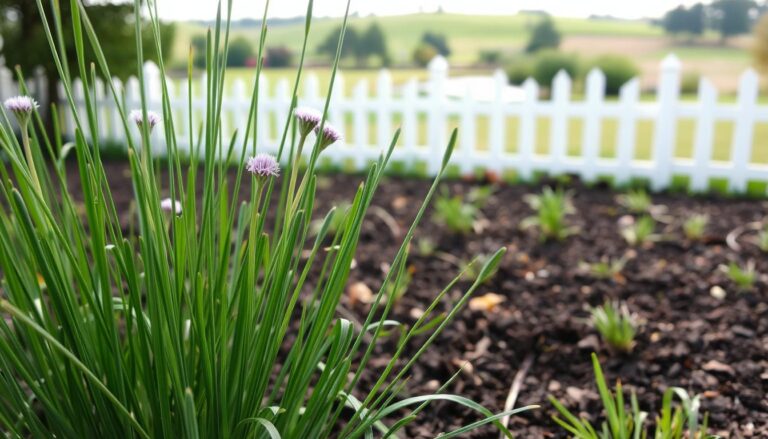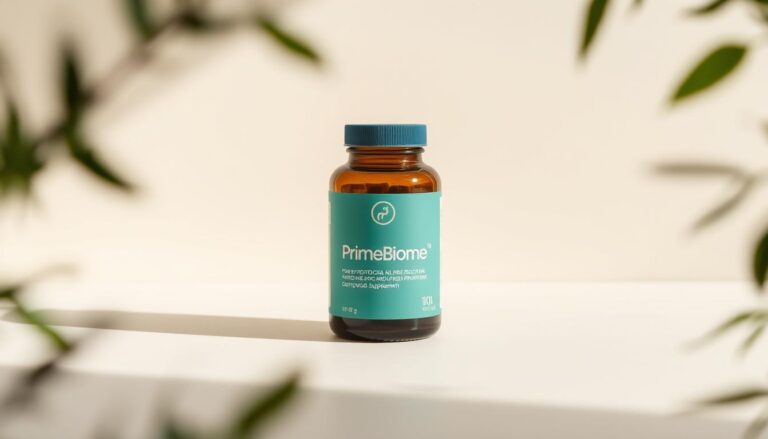Discover the Health Benefits of Antioxidant-Rich Herbs
Exploring herbal antioxidants can make you curious about their health benefits. You might ask how to add them to your daily routine. This way, you can enjoy the benefits of antioxidants and the advantages of herbal antioxidants.
Herbs and spices are packed with phytochemicals that are strong antioxidants. They play a key role in fighting oxidative stress and signaling in the body1. Antioxidant-rich herbs combine antioxidants from plant evolution. This might be a better way to fight oxidative stress and diseases1.
Key Takeaways
- Antioxidant-rich herbs can help reduce inflammation and improve cognitive function
- Herbs and spices are rich in phytochemicals with potent antioxidant properties1
- Incorporating antioxidant-rich herbs into your diet can support overall well-being
- Antioxidant-rich foods, particularly herbs and spices, may be a more effective approach in combatting oxidative stress and associated diseases1
- High doses of specific antioxidants may not provide comprehensive protection against oxidative stress-related diseases1
- Antioxidant-rich herbs can be used in various ways, including teas, supplements, and cooking2
Understanding Antioxidants and Their Role in Health
Exploring natural antioxidants means knowing what they are and how they fight free radicals. Free radicals are harmful and linked to diseases like diabetes and cancer3. They can also cause inflammation and health problems4.
Free radicals come from inside our bodies, like inflammation, or outside, like pollution and cigarette smoke4.
Top antioxidant herbs are key to good health because of their antioxidant properties of herbs. Antioxidants fight free radicals and reduce oxidative stress. Herbs and spices are packed with antioxidants, offering great health benefits. Studies show that antioxidants can lower the risk of oxidative stress-related diseases4.
Antioxidants are found in many foods, including:
- Foods with rich, vibrant colors, such as fruits and vegetables
- Nuts and seeds, like almonds and sunflower seeds
- Herbs and spices, such as turmeric and ginger
Antioxidants work best when combined with other nutrients and plant chemicals found in natural foods5. Eating a diet full of fruits, vegetables, and legumes can lower the risk of chronic diseases5.
| Food | Antioxidant Content |
|---|---|
| Blueberries | High |
| Spinach | High |
| Almonds | Moderate |
Eating top antioxidant herbs and other antioxidant-rich foods can help reduce oxidative stress. This promotes overall health and well-being.
The Science Behind Antioxidant-Rich Herbs
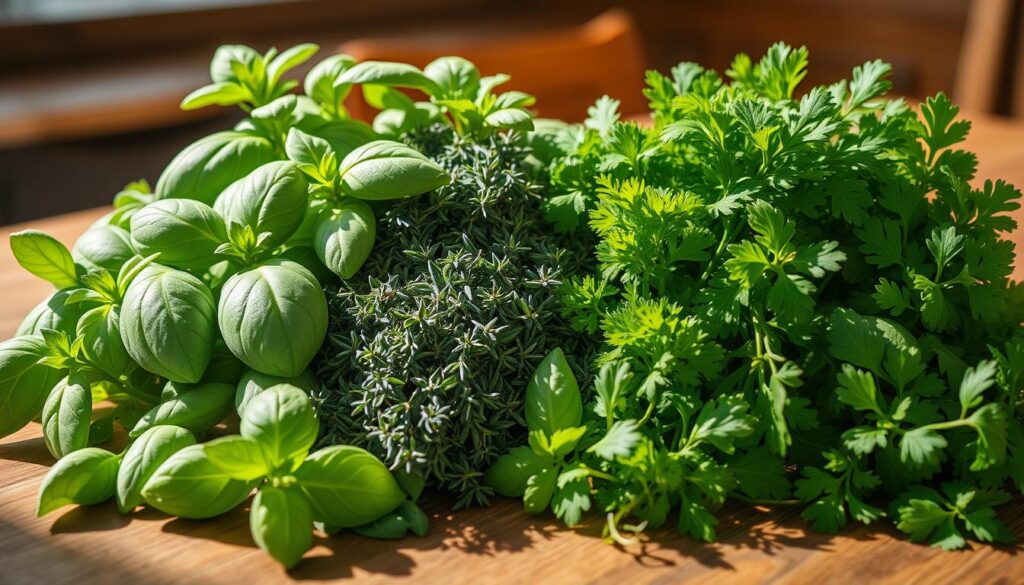
Antioxidant-rich spices and herbs offer many health benefits. They can lower the risk of chronic diseases6. Herbs like oregano and rosemary have compounds that protect cells from damage and inflammation7.
These herbs can be used in cooking or in herbal teas. They add flavor and health benefits to your meals.
Some top antioxidant herbs are oregano, thyme, and rosemary7. They have more antioxidants than many fruits and veggies. Adding them to your diet is a smart choice.
Spices like turmeric and ginger also have benefits. They fight inflammation and can lower disease risk8.
Adding antioxidant-rich spices and herbs to your diet is good for your health. By choosing the right herbs and using them in different ways, you can protect your cells. This helps prevent chronic diseases6.
Top Powerful Antioxidant Herbs for Optimal Health
Antioxidant-rich herbs are great for our health. They help reduce inflammation and boost brain function. Adding these herbs to our daily routine can improve our overall well-being.
Herbs like turmeric, oregano, sage, and rosemary are full of antioxidants. Turmeric, for instance, is packed with curcumin, which fights inflammation9. Oregano is also powerful, with benefits against microbes and inflammation9. Rosemary is another top choice, with antioxidants like carnosol and rosmarinic acid9.
It’s easy to add these herbs to our meals. They work best when paired with other antioxidant foods. This way, we get more health benefits. Rosemary extract is even approved in the EU for its antioxidant properties10.
These herbs can also be mixed to make even stronger antioxidant blends. Using them can help keep us healthy and lower disease risks. Adding them to our health routine is a smart move.
Lesser-Known Herbs with Remarkable Antioxidant Properties
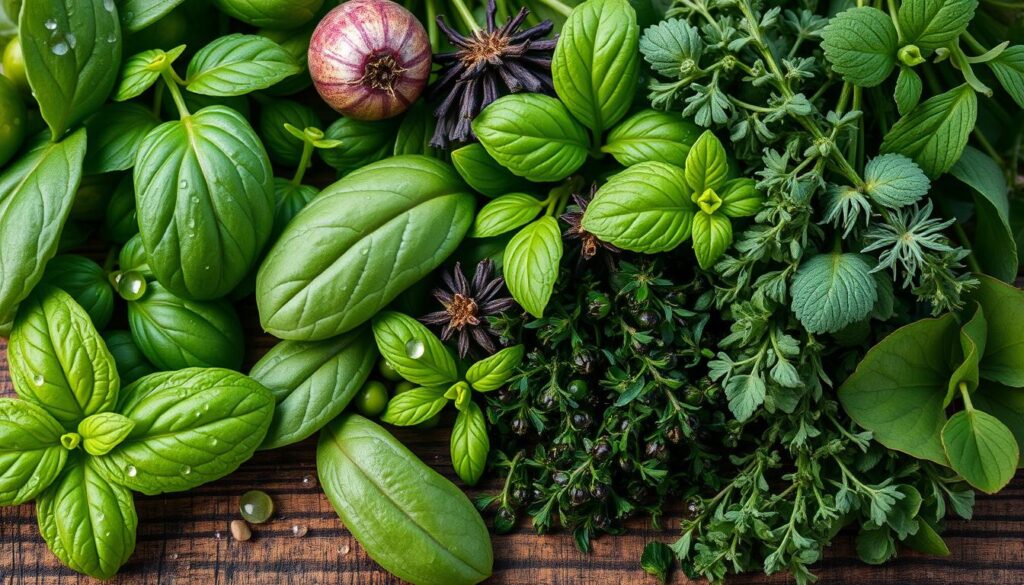
Many know about turmeric and rosemary as natural antioxidants. But, there are many lesser-known herbs with amazing antioxidant properties of herbs. These herbs are great for health and well-being. Prasad KVSN says amla, holy basil, and ashwagandha are top choices11.
Amla is packed with vitamin C and fights inflammation12. Holy basil is good against bacteria and diseases13. Ashwagandha helps with stress and anxiety11.
Clove has more antioxidants than blueberries13. Oregano has the most antioxidants and phenolics13. You can use these herbs in teas, supplements, or recipes.
| Herb | Antioxidant Properties |
|---|---|
| Amla | Rich in vitamin C, anti-inflammatory properties12 |
| Holy Basil | Antioxidant and antibacterial properties13 |
| Ashwagandha | Antioxidant and anti-inflammatory properties11 |
How to Identify Quality Antioxidant Herbs
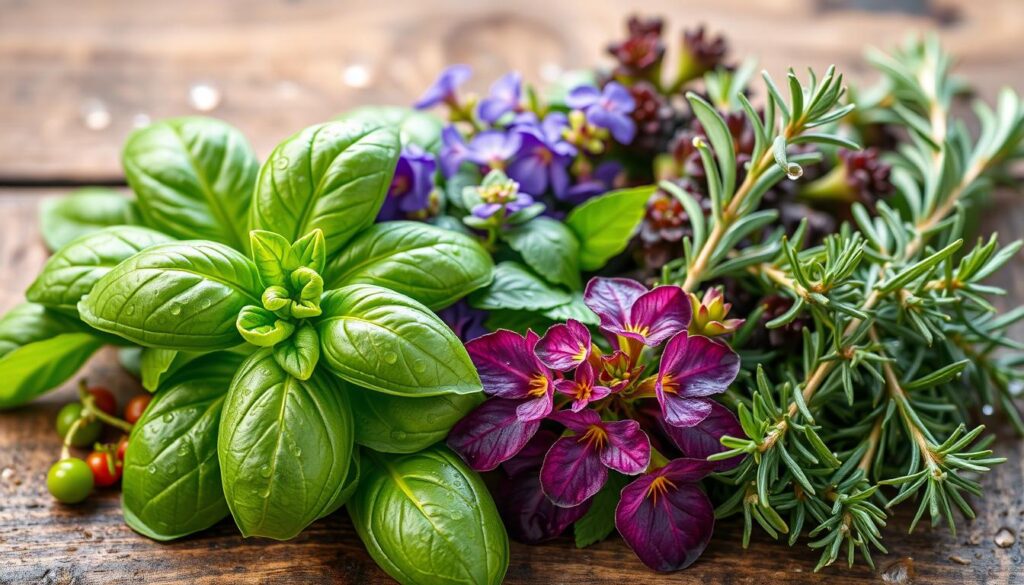
Choosing the right antioxidant herbs is important. The quality can change based on freshness, whether they are organic or not, and how they are stored14. To get the most from antioxidants, picking top-notch herbs is key.
Several things impact the quality of antioxidant herbs. Here are a few:
- Freshness: Fresh herbs usually have more antioxidants than dried ones15.
- Organic vs. conventional: Organic herbs might have more antioxidants since they don’t have pesticides15.
- Storage and preservation: How herbs are stored and kept can keep their antioxidant levels high14.
By thinking about these points, you can pick the best antioxidant herbs. Always go for the highest quality to get the most from antioxidants.
Exploring antioxidant herbs? Remember, the best benefits come from choosing top-quality ones15. With the right knowledge, you can fully enjoy what these herbs offer for your health.
Incorporating Antioxidant Herbs into Your Daily Diet
Exploring natural antioxidants shows that adding top antioxidant herbs to your diet is simple and tasty. You can choose from teas to spices to enhance your meals with antioxidant properties of herbs. Prasad KVSN says adding these herbs daily can boost your health and well-being16.
Clove, oregano, and ginger are among the most powerful antioxidant herbs. They pack a punch of antioxidants16. For instance, just 1/2 teaspoon of ground clove has more antioxidants than 1/2 cup of blueberries16. You can spice up your meals or brew teas and infusions with these herbs.
You can also take top antioxidant herbs as supplements or drink antioxidant-rich teas. Studies show that a diet full of natural antioxidants can fight chronic diseases like heart disease, cancer, and Alzheimer’s17. By adding antioxidant properties of herbs to your diet, you support your health and well-being18.
Brewing Antioxidant-Rich Herbal Teas
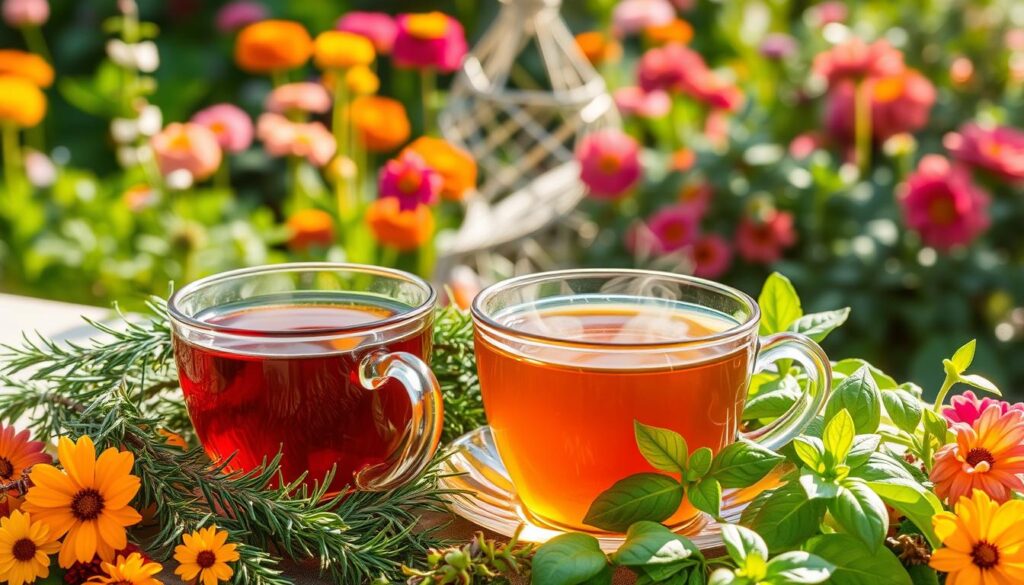
Choosing the right method to brew herbal teas is key. You can use hot water or cold infusion, depending on the herbs. For example, peppermint, ginger, and turmeric need hot water to release their antioxidants19.
Herbs like turmeric, ginger, and cinnamon are packed with antioxidants20. You can mix them with other spices for a tasty tea. The amount of antioxidants in these herbs can change based on how you brew them19.
To get the most antioxidants from your tea, steep it correctly. Use boiling water at 212 degrees Fahrenheit for up to 120 minutes21. Or, try cold steeping to keep more antioxidants.
Here are some tips for brewing antioxidant-rich herbal teas:
- Use fresh and high-quality herbs to get the most antioxidants.
- Experiment with different brewing methods and steeping times to find your favorite.
- Combine different herbs and spices to create unique and flavorful teas.
By following these tips and using the right herbs and brewing methods, you can create delicious and antioxidant-rich herbal teas. These teas support your health and well-being20.
| Herb | Antioxidant Content | Brewing Method |
|---|---|---|
| Turmeric | High | Hot water steeping |
| Ginger | High | Cold infusion |
| Cinnamon | Moderate | Hot water steeping |
Potential Side Effects and Precautions
It’s important to know the possible side effects and precautions when using antioxidant-rich herbs22. The NCBI Bookshelf says these herbs are mostly safe but can have some risks. They might interact with medicines or cause allergic reactions in some people23.
Some herbs, like Ginkgo biloba, St. John’s wort, and Ephedra, can cause problems like bleeding or stomach issues23. They might also affect how well medicines work, like aspirin or antidepressants23. Always talk to a doctor before using these herbs, especially if you’re on medication or have health issues.
Knowing the side effects and precautions is key to using antioxidant-rich herbs safely22. By understanding the benefits and risks, you can make better choices for your health22.
- Always talk to a healthcare professional before using them, especially if you have health problems or take medicines23.
- Be careful of how these herbs might affect your medicines23.
- Make sure to follow the right amount and how to use them22.
Combining Herbs for Maximum Antioxidant Benefits
Combining herbs can boost their antioxidant effects. Prasad KVSN says mixing herbs can support health and well-being24. This way, you can make a strong mix that fights off free radicals and stress.
Some top herbs for antioxidants are rosemary, turmeric, and oregano. You can mix rosemary with turmeric to make a tasty tea full of antioxidants24. Adding herbs like sage and thyme can make their benefits even stronger.
Here are some tips for combining herbs for maximum antioxidant benefits:
- Choose herbs with complementary antioxidant properties, such as rosemary and turmeric.
- Experiment with different combinations to find the one that works best for you.
- Consider adding other antioxidant-rich ingredients, such as berries or green tea, to enhance the blend.
By mixing herbs for their antioxidant benefits, you can make a powerful health tool. Whether you want to fight inflammation, boost brain function, or feel more energetic, the right herbs can help24.
Seasonal Guide to Growing Your Own Antioxidant Herbs
Growing your own antioxidant-rich herbs is a great way to always have fresh herbs. You can choose from many options for each season25. First, learn the basics: soil, sunlight, and water. Most herbs like soil with a pH of 6.0-7.025.
Basil, chives, and lavender are popular herbal antioxidants. They thrive in full sun and well-drained soil26. These herbs not only offer benefits of antioxidants but also flavor and fragrance to dishes. For instance, basil adds a strong anise taste to Italian dishes26.
There are many herbs to choose from, depending on the season. Winter herbs like echinacea and elderberry boost the immune system27. Spring herbs like nettle and dandelion help with detox and allergy relief27. Adding these antioxidant-rich herbs to your daily routine can improve your health and well-being.
Summer herbs like mint and hibiscus cool the body and aid digestion27. Autumn herbs like astragalus and sage strengthen immunity and support the lungs27. Growing your own herbal antioxidants means you always have fresh herbs. This way, you can enjoy the benefits of antioxidants all year.
Modern Research on Herbal Antioxidants
Exploring natural antioxidants reveals exciting findings. Modern studies on herbal antioxidants show great promise for health benefits28. Herbs like turmeric and ginger are packed with antioxidants. These can help fight chronic diseases28.
Herbs get their antioxidant power from phytochemicals. These include flavonoids, polyphenols, and flavoproteins28. These compounds fight inflammation and cancer, making them great for a healthy diet29. Recent studies highlight:
- Herbs and spices are rich in antioxidants28.
- The Total Phenolic Content (TPC) in herbs and spices can be measured with the Folin-Ciocalteu reagent29.
- Flavonoid Content (FC) in herbs and spices can be measured by how they react with Al(III) ions29.
Research on herbal antioxidants shows they can boost health. Adding top antioxidant herbs to your diet can reduce inflammation and protect against diseases28. Knowing about the antioxidant properties of herbs helps you choose the right ones for your diet.
Conclusion: Making Antioxidant-Rich Herbs Part of Your Wellness Journey
Starting your health journey? Adding antioxidant-rich herbs to your daily routine is a smart move30. These herbs are packed with compounds that fight off harmful free radicals. They boost your body’s defenses and improve your overall health30.
By making these herbs a part of your wellness plan, you can take control of your health. You’ll enjoy many benefits they offer.
This guide has shown you a variety of antioxidant-rich herbs, from turmeric to rosemary and sage31. You can enjoy them in herbal teas, cooking, or supplements. There are many ways to benefit from their antioxidant powers30.
For the best results, mix these herbs with other nutrient-rich foods. This balanced approach helps fight oxidative stress30. As you keep moving forward, let these amazing herbs help you become healthier and more vibrant3132.
FAQ
What are antioxidants and how do they benefit health?
Antioxidants are compounds that fight free radicals and reduce oxidative stress. They help keep us healthy by fighting inflammation and supporting brain function. They also lower the risk of chronic diseases.
What are some of the top antioxidant-rich herbs?
Top antioxidant-rich herbs include turmeric, oregano, sage, and rosemary. Amla, holy basil, and ashwagandha are also high in antioxidants. These herbs have compounds that make them powerful antioxidants.
How can I incorporate antioxidant-rich herbs into my daily life?
You can add antioxidant-rich herbs to your diet in many ways. Use them in cooking, make herbal teas, or take supplements. Drinking antioxidant-rich herbal teas is a simple way to enjoy their benefits.
Are there any potential side effects or precautions to be aware of with antioxidant-rich herbs?
Antioxidant-rich herbs are usually safe, but be aware of possible side effects and interactions. Always talk to a healthcare professional before using them, especially if you have health conditions or take medications.
How can I ensure I’m getting high-quality antioxidant herbs?
Choose antioxidant-rich herbs based on freshness, whether they are organic or conventional, and how they are stored. High-quality herbs offer the best antioxidant benefits.
